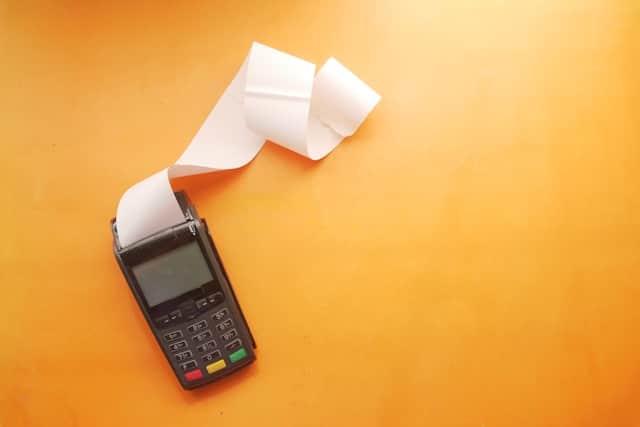What Small Business Expense Reports Do You Need to Keep For Taxes?

Updated January 1, 2021
In this article, we discuss the small business expense reports you need to keep for taxes.
6 Key Findings About Small Business Expense Reports
- If you are a sole proprietor and you report a loss on your taxes, make sure you can document all business expenses. Be especially careful that you don’t claim personal expenses as business expenses.
- Document cash payments and expenditures just as closely as non-cash transactions. Don’t assume the IRS can’t trace cash transactions. The IRS uses several methods to investigate cash-intensive businesses. One of these is comparative analyses of similar businesses. Consult BizStats for information about your industry to determine how you compare.
- Most paper receipts are printed on thermal paper which fades quickly. Take a photo of receipts or have them emailed. Create a receipts folder on your computer. Print out emailed receipts. Back up your computer files regularly.
- You can also use a document scanning app on your phone to scan and save receipts. Some will save to Dropbox. Make folders for general expense categories. File by tax year. Using search tools, you can easily locate any receipt you’ve scanned and saved. Examples of receipt scanning apps are NeatDesk, Expensify, Scanner Pro, and Evernote Scannable.
- Many small business owners believe there is a 3-year statute of limitations on tax audits. The IRS can challenge your business taxes past the 3-year mark in many circumstances—especially if they believe you underreported business income.
- Be safe and keep records longer than the IRS mandates. You may need to amend a prior year tax return. And you will need documentation if you are challenged by the IRS, a vendor, or a former employee.
How Long Do I Need to Keep Small Business Expense Reports?
The Small Business Administration recommends keeping many records permanently. Here are SBA recommendations for the most common small business records.
- Tax returns: forever
- Expense receipts: 3 years
- Employment tax records: 4 years
- Invoices and receivables: 5 years
- Checks and payables: 5 years
- Auditor reports: forever
- Annual statements: forever
- Inventory: 4 years
- Employee withholding: 7 years
- Payroll records: 6 years
- Personnel files: 3 years
- Employee time cards: 2 years
- Tax bills and statements: forever
- 1099s: forever
Small Business Expense Reports and Tax Recordkeeping FAQs
Q. If I use my phone for business and personal communication, can I write it off?
A. Only the business portion. Estimate the ratio of business to personal use and claim that portion of the costs. Save receipts for phone purchases and cell phone plan payments.
Q. Are credit card statements adequate for showing business expenses?
A. A credit card statement shows the name of a vendor, amount of the sale, and date. But it doesn’t show the item purchased. Print off the actual order to verify that the item purchased was a legal business expense.
Q. Is it true that you don’t have to document business meals and travel expenses if the amount is less than $75?
A. Though this may be true in some situations, you still have to justify that the expense is ‘ordinary, necessary, and reasonable.’ To do this, you need to document the amount, the purpose, and the time and place you incurred the expense. Keep ALL receipts of business expenses even if the purchase is less than $75.
Q. Can I wait to pay my business taxes if I file for an extension?
A. No. You must pay the estimated tax amount by the deadline. The extension applies to your return, not the tax payment.
Q. What’s the standard mileage rate for deducting vehicle expenses?
A. When calculating the cost of operating a vehicle for business use, you can use the actual cost or the standard rate. The standard mileage rate increased for the 2019 tax year to 58 cents per mile. NOTE: You can’t use the standard mileage rate if you have used the depreciation method under Modified Accelerated Cost Recovery System (MACRS).
Don’t Forget to Document These Home Office Write-offs
You can’t claim a business expense if you don’t have a record of it. Here are some oft-overlooked home office expenses to document.
- Bank fees
- Membership fees for business associations or organizations
- Credit card convenience fees
- Education and training expenses
- Tax preparation fees for business taxes
- Licenses
NOTE: The content provided on this website is for general guidance and informational purposes. This article is not intended to provide legal, business, or tax advice.
Simplify HR management today.
Simplify HR management today.
9 Best Receipt Apps for Small Businesses and Freelancers in 2024
As a business owner or freelancer, you’re spinning many plates at once. You’re keeping up with payroll, making pitches, nurturing your email marketing funnel, and much more. All to maintain and grow your business. The last thing you need is to panic each month as you look for receipts at expense report time. Administrative work…
Read MoreYour Guide to GPS Time Tracking (Geofencing)
Updated March 19, 2024 When your business has employees working remotely or at various job sites, time tracking can become a challenge, particularly if the company relies on physical clocks for punching in and out. But offering a mobile app or web-based tracking solution can cause some concerns. You might wonder whether employees are clocking…
Read More





